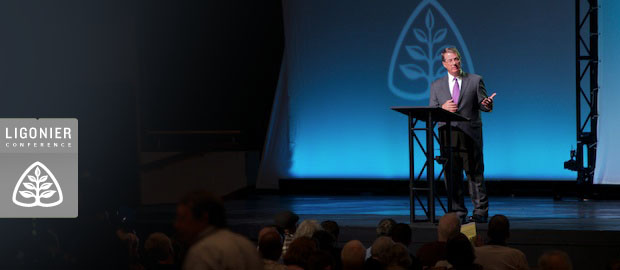http://www.ligonier.org/blog/session-2-robert-godfrey-2012-national-conference/
Session 2, Robert Godfrey — 2012 National Conference

The second message of the 2012 Ligonier Ministries National Conference was from Dr. Robert Godfrey and titled, “We Don’t Need No Education.” Dr. Godfrey reminded us that at one time Christians, particularly Reformed Christians, were the intellectual leaders in America, but that this is no longer the case. He explained the role that anti-intellectualism played in this self-inflicted problem and what we must do to turn it around.
The complete audio and video of this session will be available soon, but below are a few highlights from this challenging session.
Anti-intellectualism is a recurring problem in the history of Christianity.
- Some Christians believe the Bible teaches (1 Cor. 8:1) – “Knowledge puffs up.”
- One of the most misused texts in the Bible.
- Knowledge inevitably leads to pride and arrogance. The antidote is to flee knowledge.
- One of the main proponents of this view was Jerome – one of the most learned men in the early church.
- St. Francis of Assisi – They should pray more than they study.
- Augustine - It is possible to have great wisdom without much knowledge, and it’s possible to have great knowledge without wisdom.
- Paul in 1 Corinthians 8:1 is talking about knowledge that has been distorted and misused.
- The shift was epitomized by the election of Andrew Jackson to be President.
- Power passed from the snobs to the mobs.
- There was not only a political shift, but a wholesale cultural shift.
- Democracy became the byword not just for our politics, but for our way of life.
- There was a revolt against experts in medicine, the legal profession, and ministers.
- If the Bible is clear, why do we need experts to tell us what the Bible says?
- As Americans moved West, the landscape of American Christianity changed.
- In the late eighteenth century, most American Christians were Presbyterians and Congregationalists. Fifty years later, most American Christians were Methodists and Baptists.
- In the late eighteenth century, most American Christians were postmillennialists.
- The attitude was: we need to be doers not thinkers.
- Christianity is fully capable of glorious intellectual defense and propagation.
- There has been opposition to the truth of Christ.
- It has come to dominate the world in which we live, but not because Christianity is incapable defense.
- It is because Christians retreated and gave up.
- An intellectual defense of the faith is important to encourage Christians and to cause non-Christians to pause and think.
- Christianity is capable of scholarly defense.
- We have begun to see a resurgence of a commitment to an intellectual defense of Christianity in the last several decades.
- Religion has prospered while theology has gone bankrupt.
- The result is not no theology, but lots of bad theology.
- Calvin said: Nothing is as arrogant as ignorance.
 Dr. Robert Godfrey is the president of Westminster Seminary California, professor of church history, and a Ligonier Ministries Teaching Fellow. He is a member of the board of Ligonier Ministries and the author of An Unexpected Journey and many other titles.
Dr. Robert Godfrey is the president of Westminster Seminary California, professor of church history, and a Ligonier Ministries Teaching Fellow. He is a member of the board of Ligonier Ministries and the author of An Unexpected Journey and many other titles.
No comments:
Post a Comment